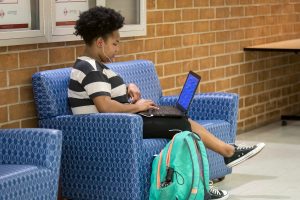Distance and Remote Learning (DRL) Task Force

The College of Education convenes a Distance and Remote Learning Task Force that is charged with promoting quality online instruction, supporting new online academic and professional learning programs, and promoting research on distance and remote learning topics. The task force welcomes new participants who are interested in supporting distance and remote learning, development, and research in the college. Email the task force coordinator to join and receive future meeting invites.
- Inventory of current Distance and Remote Learning Task Force members
- Task Force Project Space on Moodle provides access to task force reports and workgroup meeting minutes (internal use only)
Distance and Remote Learning Programs in the College of Education

The College of Education and its Friday Institute for Educational Innovation offer more than 20 fully online master’s degree programs, two online non-degree alternative licensure pathways for prospective teachers, online graduate certificate programs, and online professional learning programs, as one of the largest providers of distance and remote learning at NC State University. In the College of Education, “distance learning” refers to formal academic programs that are conducted completely online, while “remote learning” refers to courses that are typically held on campus but have been moved partially online as part of a hybrid class or temporarily online in response to an unforeseen situation (e.g., weather emergency, pandemic). In either case, the university and college provide teaching faculty with training and support to offer quality online courses using the latest asynchronous, synchronous, and interactive tools.
- Inventory of available online certificate programs, online non-degree licensure programs, and online graduate degree programs in the College of Education
- Inventory of online professional learning opportunities through the Professional Learning and Collaboration Environment (PLACE) at the Friday Institute
Improving Online Teaching Practice
The College of Education works closely with the Distance Education and Learning Technology Applications (DELTA) unit at NC State and with our college’s Media and Education Technology Resource Center (METRC) to prepare faculty for quality online teaching.
- Faculty engaged in distance teaching are encouraged to participate in DELTA’s course quality program with different pathways to quality based on the national Quality Matters (QM) standards. See Inventory of College of Education faculty who have achieved QM quality recognition for their courses.
- Numerous university offices provide ongoing training programs and archived resources for graduate students and faculty engaged in online course development and instruction. See upcoming and archived professional learning events and resources from DELTA, the university libraries, and our college’s METRC.
Developing New Distance and Remote Learning Programs

Consulting and grant support is available to faculty and staff developing new distance or remote learning courses or programs, including academic programs (certificates, degrees), professional learning programs, and expanded center or extension work scaled through distance approaches.
- For internal college faculty and staff developing new programs, email the DRL Task Force coordinator if you would like to consult with task force members on the development of a new or expanded program. Also available from the task force’s Moodle project space are sample online certificate, course, and curricular actions to aid in preparing new actions.
- In addition to this internal support, DELTA offers six types of grants to help faculty design, develop, or improve new online courses or programs. An inventory of College of Education faculty who have received DELTA grants is available to help identify colleagues who can provide guidance on DELTA expectations prior to preparing a new application.
Developing Distance and Remote Learning Research
The DRL Task Force promotes the development of new distance and remote learning research by communicating research opportunities and association outlets in its monthly email newsletter, connecting faculty with other researchers interested in DRL topics and open research clusters, providing resources that may assist in new proposal development, and offering an annual award for best faculty and graduate student research project focused on a distance or remote learning topic. The DRL Task Force is planning further archival material for its Moodle project space, including: annotations of published DRL research and reports to assist faculty who are proposing new DRL research, and anonymized data sets from college distance courses to assist in training graduate students on analytical/research methods appropriate for inquiring into distance learning environments (e.g., text mining, social network analysis) with visualized data representations.
- Inventory of College of Education distance and remote learning researchers and research projects (faculty interested in DRL research or with research projects involving DRL are encouraged to add themselves and their work to this document; graduate students interested in becoming involved in DRL research may identify open projects through this document and reach out to the lead faculty member)
- Inventory of College of Education graduate students completing a distance or remote learning focused thesis or dissertation, with links to electronic thesis or dissertation (ETD) files.